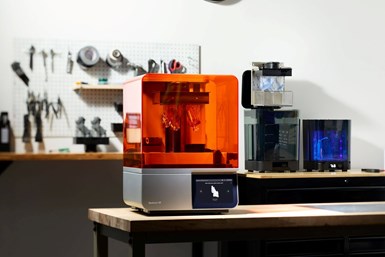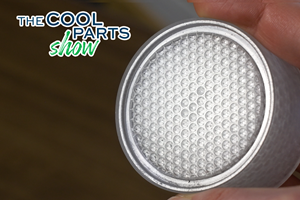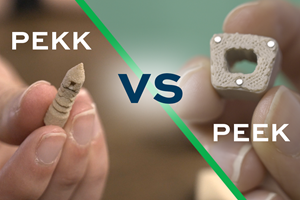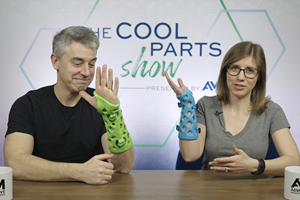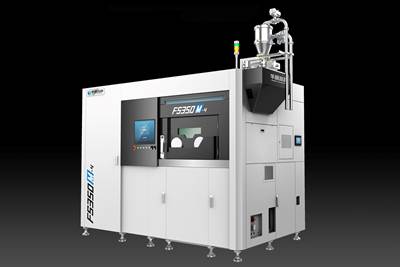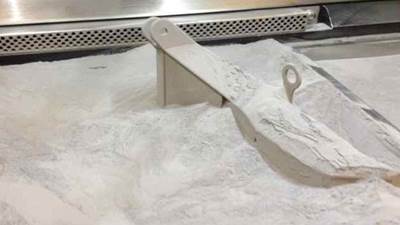Formlabs’ Form 4 3D Printer Offers New Levels of Reliability and Speed for Stereolithography
The Form 4 is designed to deliver most parts in less than two hours, offering users a powerful, affordable tool to bring ideas to life at fast speeds with excellent reliability, print quality and ease of use.
The Form 4 is a fast, reliable 3D printer for professionals, delivering most parts in under two hours. Source: Business Wire
Formlabs’ Form 4 and Form 4B are the company’s new flagship resin 3D printer sets. They feature a proprietary new Low Force Display (LFD) print engine, updates to the company’s library of resins, new automated postprocessing and an improved user experience.
Form 4 is validated to use 17-plus performance materials from Formlabs’ materials library, with new materials being added regularly. Form 4B is designed for health care professionals in the dental and medical industries, and is compatible with 15 additional biocompatible materials.
The company says the Form 4 offers up to five times faster print speeds that can unlock new levels of productivity for product designers, engineers, manufacturers, health care professionals and innovators to take on design challenges and accelerate time to market.
“Form 4 is a huge leap not only for Formlabs and our customers but also for the entire 3D printing world,” says Formlabs CEO and co-founder Max Lobovsky. “More than a decade ago, Formlabs created the desktop SLA 3D printer category and set a new standard for accuracy, reliability, ease of use and affordability in 3D printing. We’ve built on the strength and insights gathered from more than 130,000 printers on the market and over 300 million parts printed to deliver the Form 4, our best SLA printer ever. Its reliability and new level of speed will transform how our customers develop new products.”
As the company’s fourth generation of desktop resin 3D printers, Form 4 is said to take performance to new levels by delivering fast print speeds, excellent reliability, industry-leading material properties, excellent print quality and intuitive operation.
The Form 4 offers prints two to five times faster than the Form 3+, depending on material, enabling same-hour iteration or batch production with masked stereolithography (mSLA) technology. It completes most prints in under two hours and small parts in minutes of cycle time. It can also achieve maximum vertical print speeds of 100 mm/hr.
It features an LFD print engine with an ultrahigh power backlight (16 mw/cm2), proprietary release texture, light processing unit 4 (LPU 4) and dual-layer, flexible film resin tank. It is said to offer unmatched reliability thanks to validated print settings, precision heating, force sensing and debris detection. With 50-micron pixels, highly collimated light, advanced pixel smoothing and light touch supports, the Form 4 offers excellent print quality.
The system is designed for intuitive use so that anyone can learn to print in 15 minutes. It offers automatic resin handling, instant material changes, automated postprocessing and quick-release build platform technology.
The company says the Form 4 offers a 40% lower cost per part, delivering affordability with long-lasting resin tanks (75,000+ layers) and light processing unit (1M+ layers), lower resin pricing, 30% larger print volume and 3.5 times higher throughput.
“We support all hardware categories at Microsoft. Form 4 is our go-to choice for projects needing tight tolerances and engineering-grade materials,” says Mark Honschke, Additive Prototyping Lead, Microsoft. “It produces high-performance parts with amazingly fast print times and makes it possible for our model makers to produce multiple iterations in a 24-hour period.”
Ford Motor Co. is another customer. “Form 4’s speed and materials versatility enable us to create multiple prototypes and manufacturing aids every day,” says Bruno Alves, development engineer AM/IM, Ford Motor Co. “The printer has already changed the way we design and produce parts, helping us drive efficiency in our product development."
In addition to the new printers, Formlabs is also introducing six new resins to its resin library:
- Four newly reformulated General Purpose Resins take advantage of the Form 4 ecosystem to print two to five times faster than Form 3 with improved toughness and color.
- Fast Model Resin for high-speed prototypes and production of orthodontic models.
- Precision Model Resin for highly accurate dental models that always fit.
Related Content
Ultra-Complex 3D Printed Scaffolds Enable Cell Growth: The Cool Parts Show #70
Perhaps the ultimate surface-area challenge is in bioengineering: creating structures that can grow sufficient cells within a compact volume to be effective for leading-edge medical treatments. The Southwest Research Institute develops bioreactor scaffolds that could only be made using 3D printing.
Read MoreCranial Implant 3D Printed From Hydroxyapatite Ceramic: The Cool Parts Show #76
Cranial implants are typically made from titanium or PEEK; in this episode of The Cool Parts Show, we look at how implants made from a bioceramic can improve osseointegration and healing.
Read MoreUnderstanding PEKK and PEEK for 3D Printing: The Cool Parts Show Bonus
Both materials offer properties desirable for medical implants, among other applications. In this bonus episode, hear more from Oxford Performance Materials and Curiteva about how these companies are applying PEKK and PEEK, respectively.
Read MoreDurable, Waterproof 3D Printed Casts: The Cool Parts Show #58
Recovering from an injury with an ActivArmor cast means that patients can exercise, bathe and live life while they heal. We get a firsthand look at the solution in this episode of The Cool Parts Show.
Read MoreRead Next
Alquist 3D Looks Toward a Carbon-Sequestering Future with 3D Printed Infrastructure
The Colorado startup aims to reduce the carbon footprint of new buildings, homes and city infrastructure with robotic 3D printing and a specialized geopolymer material.
Read MoreBike Manufacturer Uses Additive Manufacturing to Create Lighter, More Complex, Customized Parts
Titanium bike frame manufacturer Hanglun Technology mixes precision casting with 3D printing to create bikes that offer increased speed and reduced turbulence during long-distance rides, offering a smoother, faster and more efficient cycling experience.
Read MorePostprocessing Steps and Costs for Metal 3D Printing
When your metal part is done 3D printing, you just pull it out of the machine and start using it, right? Not exactly.
Read More




